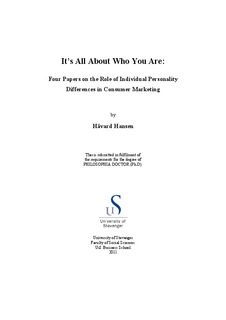| dc.contributor.author | Hansen, Håvard | |
| dc.date.accessioned | 2015-06-24T09:29:34Z | |
| dc.date.available | 2015-06-24T09:29:34Z | |
| dc.date.issued | 2011 | |
| dc.identifier.citation | It’s all about who you are: Four papers on the role of individual personality differences in cosumer marketing by Håvard Hansen, Stavanger : University of Stavanger, 2011 (PhD thesis UiS, no. 125) | nb_NO |
| dc.identifier.issn | 1890-1387 | |
| dc.identifier.uri | http://hdl.handle.net/11250/285595 | |
| dc.description | PhD thesis in Economics | nb_NO |
| dc.description.abstract | Imagine two young Norwegian women, Marie and Dina, who are enjoying a Saturday evening visit to a down town ethnic restaurant. They are of equal age, have an equal level of experience and interest in tasteful restaurant meals, their economic resources are about the same, they are both anthropology grad students, and they also have pretty common interests on a number of other areas like music, boys, fashion clothing and alpine mountaineering, to name a few. A few days later, their friend Hilde, who is a psychology student at the university, asks them about their restaurant evening, and they both agree that it was a very nice Saturday, and that the restaurant is one they can absolutely recommend. When tapping into the underlying reasons to their satisfaction, their friend learns that they are both equally satisfied with the meal, the wine, the atmosphere, and the cute Brazilian waiter. However, whereas Marie would love to visit the restaurant again in the near future, Dina would rather not. While this may come as a surprise to restaurant manager Richard, who is trained to seek customer satisfaction because repurchase is generally determined by satisfaction (Oliver, 1997), the psychology student Hilde knows exactly why Marie’s and Dina’s repurchase intentions differ; Dina is a variety seeker, who visits different restaurants for no other reason than being fond of variation (Homburg and Giering, 2001). Marie, on the other hand, is not. Hence, if Richard surveyed a number of Dina’s variety seeking companions about their satisfaction level and their intention to re-visit the restaurant, he would probably be puzzled by finding no link between the two concepts. On the contrary, if his sample consisted of Marie’s equals only, he would probably find a strong relationship between their satisfaction and their repurchase intention. Finally, if the unfortunate manager had a sample consisting of both Dina and Marie, he might end up with data telling him that there is a significant relationship between the two concepts, but that the relationship is somewhat weak. Consider then, that the same survey was conducted by a psychologist, who knew that a number of people are variety seekers, and that these customers are somewhat less likely to visit the same restaurant twice no matter how satisfied they are. Her questionnaire would include items covering the variety seeking continuum, and she would include this in her analysis. She might then find that there is a strong and significant relationship between Marie’s level of customer satisfaction and her repurchase intentions, while there is no such relationship in the data supplied by Dina. What the psychologist has done is to introduce the moderating effect of personality differences, and she would conclude that the relationship between customer satisfaction and loyalty was moderated by the consumers’ variety seeking tendency (Homburg and Giering, 2001). The moderating effect of personality traits in models of consumer marketing is what this thesis is all about. Or stated differently, the thesis introduces the typical personality psychologists’ viewpoint to the study of marketing phenomena; “There are few differences between people, but what differences there are really matter” (Burger, 2008). In other words - It’s all about who you are. | nb_NO |
| dc.language.iso | eng | nb_NO |
| dc.publisher | University of Stavanger, Norway | nb_NO |
| dc.relation.ispartofseries | PhD thesis UiS; | |
| dc.relation.ispartofseries | ;125 | |
| dc.relation.haspart | Hansen, H.; Sand, J.A. (2008) Antecedents to customer satisfaction with financial services : the moderating effect of the need to evaluate. Journal of Financial Services Marketing, 13(3), pp. 124-244 | nb_NO |
| dc.relation.haspart | Hansen, H.; Samuelsen, B., Andreassen, T.W (2011) Trying to complain: the impact of self-referencing on complaining intentions. International Journal of Consumer Studies, 35(4), pp. 375-382 | nb_NO |
| dc.relation.haspart | Hansen, H.; Mehmetoglu, M. (2009), Optimum stimulation level and consumer attitudes towards time share second homes. Journal of Vacation Marketing, 15(4), pp. 335-347 | nb_NO |
| dc.relation.haspart | Hansen, H.; Samuelsen, B.M; Sallis, J.E (2013) The moderating effects of need for cognition on drivers of customer loyalty. European Journal of Marketing, 47(8), pp.1157 - 1176 | nb_NO |
| dc.rights | Copyright the author, all right reserved | |
| dc.subject | økonomi | nb_NO |
| dc.subject | customer loyalty | nb_NO |
| dc.subject | consumer marketing | nb_NO |
| dc.subject | markedsføring | nb_NO |
| dc.subject | kundelojalitet | nb_NO |
| dc.title | It’s all about who you are: Four papers on the role of individual personality differences in cosumer marketing | nb_NO |
| dc.type | Doctoral thesis | nb_NO |
| dc.subject.nsi | VDP::Social science: 200::Economics: 210::Economics: 212 | nb_NO |
